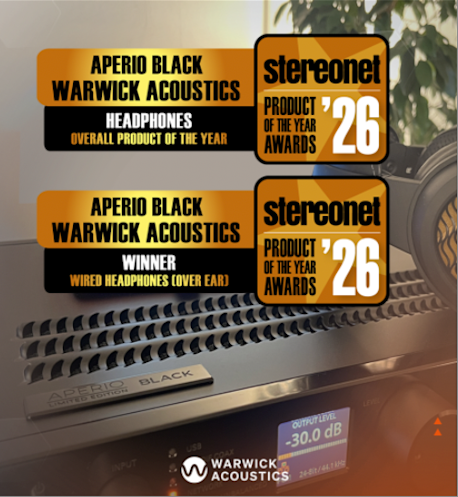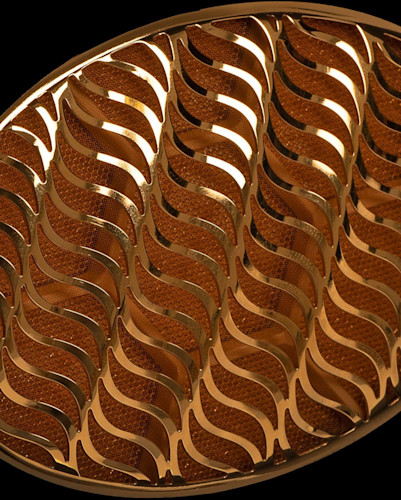
SONOMA
Technology
Technology
Explore the state-of-the-art engineering behind the Sonoma's exceptional sound.
HPEL transducer
The Sonoma M1 is the first headphone system to use our patented High-Precision Electrostatic Laminate (HPEL) audio transducer, a revolutionary development in the field of electrostatic drivers.
Unlike conventional transducers, the HPEL uses a laminated film that is just 15 microns thick (several times thinner than a human hair). The film is affixed to a cell structure and machine-tensioned with extreme accuracy to create small, sound-producing drumskins. Our software then finetunes each drumskin for optimal resonant frequencies.
To ensure the exceptionally lightweight transducer can perform as accurately as possible without the risk of bending, the panel as a whole is encased in a super-rigid polycarbonate 'cassette'.
Injected magnesium earcups
Magnesium is the ideal material to house our HPEL transducer, as it weighs about 33% less than aluminium and has superior acoustical damping. Formed through precision injection moulding at very high pressure, our magnesium earcups are just 10.7 ounces (303 grams). Better on the ear. Lighter on the head.
Custom low-capacitance cable
An electrostatic headphone presents an out-of-the-ordinary load to the amplifier. So you need an out-of-the-ordinary cable to connect the two. We collaborated with Straight Wire Inc. to develop a bespoke lightweight design for the Sonoma M1 that maximises signal purity and achieves capacitance of an ultralow 50 pF/m.
The cable is composed of very fine strands of silver-plated, oxygen-free high- conductivity (OFHC), ultra-pure copper. The insulation is a foamed polyethylene chosen for its high dielectric constant. Two Kevlar® fibres are woven in to ensure excellent strength. There is no shared ground between the left and right channel signal cables, and a fibre filler material in the jacket keeps the conductors as far apart as possible (to reduce capacitance and crosstalk).
The jack is electrically isolated from the amplifier chassis while high-precision self-latching connectors ensure a secure connection at the headphone end. If the cable is disconnected, the amplifier automatically shuts down.
Single-ended Class A amplifier
The Sonoma M1 uses a high-voltage, high-performance amplifier that is optimally matched to the HPEL. It is specifically designed to drive the inherent capacitive load of an electrostatic transducer and operates at a high bias level to improve linearity.
To cope with the power levels produced by the amplifier’s high voltages, we use high-quality devices throughout along with passive components optimised for their application in the electronic design. The amplifier is encased in a completely shielded, machined aluminium enclosure.
Digital inputs
- USB 2.0
- Coaxial S/PDIF
Analogue inputs
- 2 high-level RCA jacks
- 1 low-level 3.5mm stereo jack
ESS Sabre Reference DAC
The Sonoma M1 uses the 32-bit Sabre Reference DAC from ESS Technology, which is the globally recognised gold standard of audio digital-to-analogue converter technology. Two stereo DAC chips are used in a special mono mode to deliver a measured 129 dB signal-to-noise ratio.
Custom 64-bit fixed-point digital signal processing
For the Sonoma M1, we digitally process all signals using custom 64-bit double-precision fixed-point arithmetic, running within a multi-core XMOS processor. The resulting performance exceeds that of most professional audio workstations. We've also introduced a fully digital interpolated volume control in the amplifier, which eliminates clicks, pops and other noise issues and ensures there is no loss in fidelity or dynamic range.
Precision CNC-machined aluminium case
The Sonoma M1 amplifier case is built for beauty, strength and audio performance. We start with a solid billet of high-purity Aluminium 6063, which is extruded and CNC-machined to produce the base and side walls. A top plate and end plates are added to form the case. A special 3D-wave pattern is then cut into the base and top plate to facilitate heat dissipation. The machined parts are blasted under high pressure with fine glass beads before being clear-anodised to obtain the desired finish. All logos and labels are laser-etched into the metal so they will not fade or rub off.

